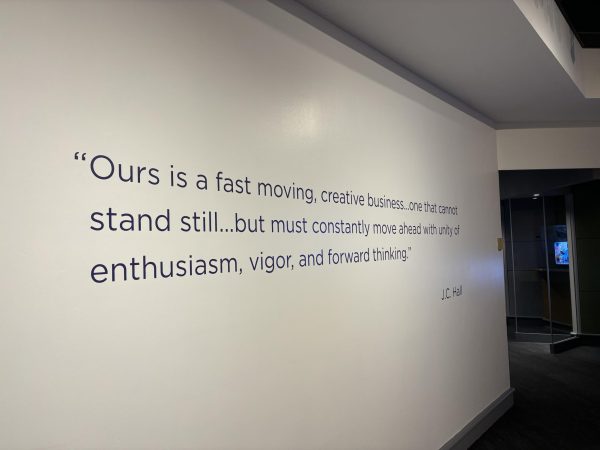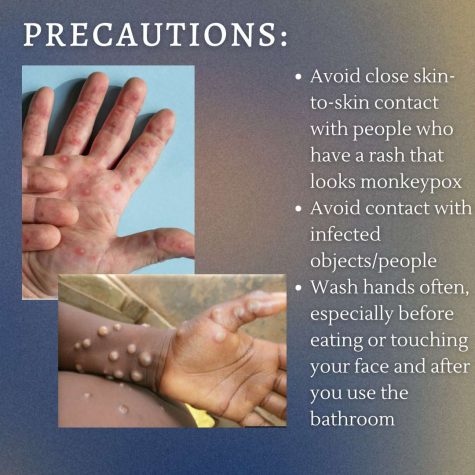Overworked, Underpaid
May 10, 2022
For years, the blood, sweat, and tears of cafeteria workers have gone undervalued as the results of their hard work are usually seen twice a day when they’re serving breakfast and lunch. The need for a new payment system is adamant.
Jackie Pearl, Food service manager of Bryant Middle School, has worked there for almost three years. Although she loves what she does, it is difficult to find a middle ground with such little pay and recognition. She prepares meals for breakfast and lunch, takes care of production and inventory on how much food there is, lifts heavy boxes and racks of food, washes the dishes, counts all of the boxes after they’re done using them, and cleans up every nook and cranny after the meals are over. Everything surrounding her kitchen at Bryant Middle is her responsibility, and sometimes it gets overwhelming, causing severe stress on her behalf as well as her employees.
“As a food service manager, this is the hardest job that I’ve done for the least amount of pay since I started working as a pre-teen,” Pearl said. “Every kitchen is understaffed right now to the point where every person that’s working is compensating for at least two other people’s jobs. It takes me back to the underpay that we were already frustrated with, so imagine being underpaid for working two or three jobs vs. being underpaid for your one job.”
According to Bryant School Districts classified pay schedule, Food service managers annual salary wavers around $20,000. For all the hard labor she does everyday, the excessive time and energy she puts into her work, she believes the manager title hasn’t changed the treatment or amount of work since she started.
“In a lot of ways my patience is pushed everyday to the point where I’m almost guaranteed to have intense road rage on my way home from work because I’ve used every bit of patience in every cell of my body by the time It’s time to leave,” Pearl said. “A lot of the time, I get home and I don’t have the energy left to be high spirited and loving to my family or my dogs. It matters to me whether I have the energy to play with them or to talk to my daughter without getting easily upset. It affects me big time.”
With the workers trying to prepare meals for breakfast and lunch, serving 790 students a day on average adds to the frustration and limited time increases the risk of injuries cafeteria workers succumb to at work.
“Just this year alone, I have had around 6 second degree burns where they’ve blistered up and could’ve gotten infected,” Pearl said. “ We’ve all been burned in this kitchen trying to hurry and get things done in a timely manner, especially since we have more kids to feed than last year. Cuts are temporary and can be healed with time, but burns last much longer. When I’m older I’m going to have all these burn scars on my arms that won’t go away.
In addition, the benefits of healthcare and dental are little to no help compared to their injuries.
“Our benefits are also horrible, Pearl said.” “It’s a horrible thing that I pay $1,416 a year for insurance and every time I go to the doctor it costs me $200. Why am I giving Bryant School District $1400 a year for health insurance if I still have to pay the doctor that amount everytime I go plus the prescriptions.”
Many Food Service workers take on multiple jobs to pay their bills. Just enough to survive. The Bryant School District’s Food Service Department and Custodians are at the bottom of the food chain salary wise, and since there is already a lack of needs met it is even more dawning on them when a life changing percentage of their monthly pay is put inside a mystery box, also known as a retirement fund.
“Ever since I took the keys as a manager of a kitchen here, they’ve started taking out 6.25% of my pay and putting it in retirement savings, ” Pearl said. “If something happens to me before I retire, will my kids get that money? I wouldn’t mind it as long as I know if I die at this job because I stroked out, are my kids going to get the money that was taken from me. If that’s so, so be it.”
As much as she loves her job and takes pride in her work, there is a disconnect between her and the people in charge regarding the wage of workers in her field. Pearl thinks that food service workers deserve more space where the food is cooked and prepared, higher quality equipment, and to be paid a fair wage that speaks for the fatal injuries, headaches, and overall struggle.
“Some of our equipment is state of the art, Pearl said. “The things that are broken hinders our job, the quality of the food and makes an already hard job even harder when there’s broken equipment. Not enough space is also a huge issue for every kitchen because the more mouths we feed, the more warmers we need and the more coolers and freezer space we need.”
Pearl believes that the risks of the job are not equally compensated for in the paychecks they receive.
“I do really well to get one break in the day. I definitely think the base rate for cafeteria workers is based on an outdated payment system. When you can start out at Walmart making $15 an hour and you want people to apply here knowing they’re at high risk of getting burnt, cut, and hurt in the process doing an extremely tedious and fast paced job, that alone should be enough to receive a higher wage.”
Still hopeful and determined to make the best of her time as manager, Pearl aspires to be a light for the kids at Bryant Middle School. She cares for the betterment of the kids and is passionate about making sure the quality of their food is beyond great, as there are some students who leave after school to a place where that option isn’t there for them.
“I feel good about what I do everyday, and I know that I make a difference which makes me hopeful,” Pearl said. “ I know that when I’m here the food is better, and kids are noticed who might not be if I weren’t here. I don’t want to go anywhere else, I just wish we were paid fairly for the hard work we do.”















